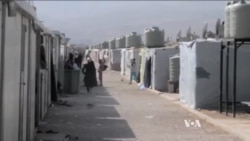Running his hands over the fresh produce with a grocer’s pride, he is a born-again businessman — and a symbol that refugee camps can offer something more than the very basics.
Mohammed Kiki oversees a vegetable shop at the Inmaa camp in Lebanon’s Bekaa valley.
It is just one camp among many in a country that has struggled to cope with an influx of what some estimate to be more than 1.5 million Syrian refugees.
But this camp is different. Rather than tents, it offers its 1,700 residents solid homes, and with them, a chance at finding some sense of normalcy.
Kiki’s grocery store is just one way new efforts are being made to create a sustainable future for those displaced by a conflict that shows no signs of abating.
The shop sells to the refugee community in the camp, which was established in 2013 and is overseen by a local NGO named Ighatheya.
The store is now self-sustaining but was started with NGO support explained Kiki, who is 67 years old and fled Damascus for Lebanon three years ago.
"I have nothing — I am an old man — no big children to support me, I just have a small child," he said. “They supported me, they gave me the shop and paid for all the measures despite my high age,” adding that living in Inmaa was “like being at the home of our own family” compared to previous camps he’d endured.
The grocery store is part of a souk — or marketplace — offering employment to refugees and selling everything to the camp community from haircuts to mobile phone top-ups.
Empowering through work
Ighatheya collaborated with a number of organizations, including the United Nations and the International Red Cross, to build the camp.
The pooling of funds allowed provision of a variety of services.
Families living in the homes provided — mainly caravans — have access to a school and a medical clinic, while water is made safe at the on-site purifying plant.
However, with donor fatigue affecting many organizations helping refugees, efforts at making the camp more sustainable have a new urgency.
The bricks-and mortar construction of a large bakery will soon create jobs for up to 14 families, with the hope that it will provide enough daily bread for the camp’s residents.
It is part of broader efforts to make the camp more self-sufficient, explained Baraa Abounouh, a program development coordinator for Ighatheya.
Abounouh told VOA that along with empowering refugees through work, the idea was also to ensure that the camp did not “have to wait for help from others.”
The jobs on offer may provide only a small portion of the camp with employment, but they are likely to be sought after.
Working and living in Lebanon, already a struggle for many Syrians, was made all the tougher by a clampdown in recent months by the government, which has sought to stop the arrival of more refugees.
Not really home
Meanwhile, with the state is refusing to set up "official" refugee camps for fear of encouraging permanent settlement by Syrians, the kind of longer-term thinking visible at Inmaa is not welcomed by everyone.
The camp is one of a number raided by the Lebanese Army, which has been increasingly engaged in countering threats from jihadist groups along Lebanon’s border with Syria.
Human Rights Watch Lebanon director Nadim Khoury told VOA that although efforts to move from a crisis response to something more sustainable were crucial, they were viewed warily by some in the government.
“It’s become clear that many Syrian refugees are going to have to remain refugees for a longer period than expected,” he said.
“Many temporary measures are no longer sufficient and people are either in a way making their presence a bit more consolidated or starting to see efforts at creating structures that are better for living.”
“At the same time, this longer period is scaring a lot of Lebanese officials," Khoury said.
He added that while building more sustainable camps might be part of the solution, the majority of Syrians still live away from such settlements.
“We need a broader housing strategy for refugees,” he added.
Accusations that their efforts are encouraging permanent settlement are hotly denied by those running the camp.
They point to legal contracts signed by residents focused on the temporary nature of the residency, as well as an agreement with the local municipality to eventually hand over the camp's land for clearance and use by the surrounding community.
Most of all, they insist they are simply seeking to make life better for those whose lives have been shattered by war.
People such as Mustafa Hammoud, who has been at Inmaa for just over a year, having fled his home outside Damascus. He has two daughters being educated at one of Inmaa's schools.
“There is nothing that can replace you your country. There is nothing that you can find like your home country in terms of what it offers to you. But thanks God we got a substitute for our country now,” he said.





